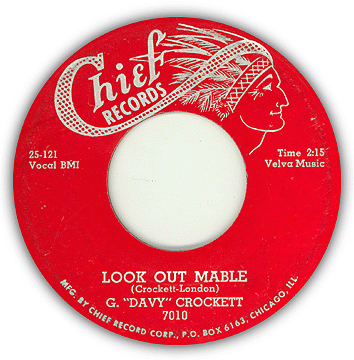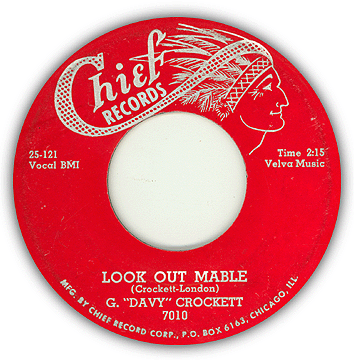| info on eBay by reelgeorgeinc: | For those who are fans of the scant legacy of G. L. Crockett, this is where it all begins, the very first record for Crockett, and what a debut ! This one's from 1957 and finds him being marketed as "G. Davy Crockett' instead of his real name. Considering it was several years after the Davy Crockett craze it couldn’t have helped. This single on Chief Records is a great pair of tunes. The topside "Look Out Mable" is a great up tempo romp, while the flip "Did You Ever Love Somebody (That Didn't Love You)" is a killer blues number with a strong guitar part. When (if ever) this turns up it's frequently on 78rpm. It's quite rare to find a clean 45rpm such as this. In the '60s he lived in the Washington, D.C. area during the 1960s and made his mark with "It's a Man Down There" on the tiny Four Brothers label in 1965. It was turned into a hit for the Allman Brothers years later. In 1965 he re-recorded the song "Look Out Mable" but it was still nearly as obscure as this original release 8 years earlier. |
  |
|
| artists: | VARIOUS ARTISTS |
| label: | MOONSHINE BLP 117 |
| title: | TAKE A GREYHOUND BUS AND RIDE |
| release: | late '80's, Belgium, LP |
| A-side: |
|
| B-side: |
|
| session details: | Chicago, Illinois, 1965 G.L. Crockett - vocal |
| biography: | Born George Crockett, 18 September 1928, Carrollton, Mississippi Died 15 February 1967, Chicago, Illinois The total recorded output of G.L. Crockett comprises only four singles, one of which was a minor hit. But that hit is not the recording for which he is best remembered. Nothing is known about Crockett’s early years in Mississippi, except that he came in this world on September 18, 1928, according to the Social Security Death Index, and not in 1929, as most websites and a few printed sources will have us believe. By the mid-1950s he was living in Chicago, which was the place to be for blues singers at that time. Crockett was evidently keen to make his mark among the musicians who flourished in the city’s West Side clubs. It was here that Crockett played with Freddie King and Magic Sam, another black blues musician whose work strayed close to rockabilly. |